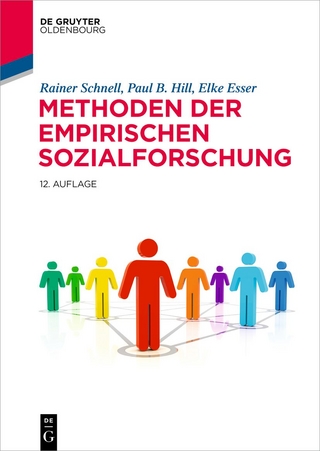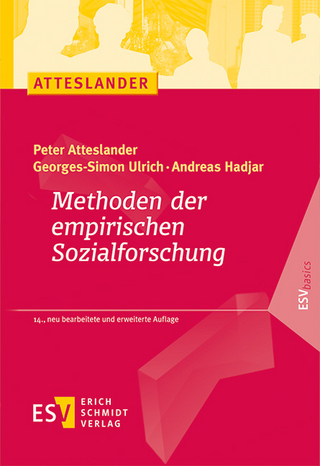
Cross-Cultural Analysis
Routledge Academic (Verlag)
978-1-84872-823-3 (ISBN)
- Titel erscheint in neuer Auflage
- Artikel merken
Intended to bridge the gap between the latest methodological developments and cross-cultural research, this interdisciplinary resource presents the latest strategies for analyzing cross-cultural data. Techniques are demonstrated through the use of applications that employ cross national data sets such as the latest European Social Survey. With an emphasis on the generalized latent variable approach, internationally–prominent researchers from a variety of fields explain how the methods work, how to apply them, and how they relate to other methods presented in the book. Syntax and graphical and verbal explanations of the techniques are included. A website features some of the data sets and syntax commands used in the book.
Applications from the behavioral and social sciences that use real data-sets demonstrate:
The use of samples from 17 countries to validate the resistance to change scale across these nations
How to test the cross-national invariance properties of social trust
The interplay between social structure, religiosity, values, and social attitudes
A comparison of anti-immigrant attitudes and patterns of religious orientations across European countries.
The book is divided into techniques for analyzing cross-cultural data within the generalized-latent-variable approach: multiple-group confirmatory factor analysis and multiple-group structural equation modeling; multi-level analysis; latent class analysis; and item-response theory. Since researchers from various disciplines often use different methodological approaches, a consistent framework for describing and applying each method is used so as to cross `methodological borders’ between disciplines. Some chapters describe the basic strategy and how it relates to other techniques presented in the book, others apply the techniques and address specific research questions, and a few combine the two. A table in the preface highlights for each chapter: a description of the contents, the statistical methods used, the goal(s) of the analysis, and the data set employed.
This book is intended for researchers, practitioners, and advanced students interested in cross-cultural research. Because the applications span a variety of disciplines, the book will appeal to researchers and students in: psychology, political science, sociology, education, marketing and economics, geography, criminology, psychometrics, epidemiology, and public health, as well as those interested in methodology. It is also appropriate for an advanced methods course in cross-cultural analysis.
Eldad Davidov is Professor of Sociology at the University of Zurich, Switzerland. His research interests are applications of structural equation modeling to survey data, especially in cross-cultural and longitudinal research. Applications include human values, national identity, and attitudes toward immigrants and other minorities. Peter Schmidt is Professor of Sociology at the University of Marburg and Professor Emeritus of Social Research Methods and Political Science at the University of Giessen, Germany. His research interests include the foundations and applications of structural equation models, panel data analysis, and the empirical testing of rational choice theory. Applications include national identity, immigration, and environmental behavior. Jaak Billiet was full professor in social methodology at the Katholieke Universiteit Leuven, Belgium, and is now professor emeritus with research tasks. His research interests include validity assessment and modeling measurement error in social surveys as well as longitudinal and comparative research in ethnocentrism, political attitudes and religious orientations.
Part 1. MGCFA and MGSEM Techniques. F.J.R. van de Vijver, Capturing Bias in Structural Equation Modeling. N. Allum, S. Read, P. Sturgis, Evaluating Change in Social and Political Trust in Europe Using Multiple Group Confirmatory Factor Analysis with Structured Means. J. Lee, T.D. Little, K.J. Preacher, Methodological Issues in Using Structural Equation Models for Testing Differential Item Functioning. H. Steinmetz, Estimation and Comparison of Latent Means Across Cultures. A. De Beuckelaer, G. Swinnen, Biased Latent Variable Mean Comparisons Due to Measurement Non-invariance: A Simulation Study. E. Davidov, G. Datler, P. Schmidt, S.H. Schwartz, Testing the Invariance of Values in the Benelux Countries with the European Social Survey: Accounting for Ordinality. B. Meuleman, J. Billiet, Religious Involvement: Its Relation to Values and Social Attitudes: A Simultaneous Test of Measurement and Structural Models Across European Countries. W.M. van der Veld, W.E. Saris, Causes of Generalized Social Trust: An Innovative Cross-National Evaluation. S. Oreg. Measurement Equivalence using Multi-Group Confirmatory Factor Analysis and Confirmatory Smallest Space Analysis: The Case of Dispositional Resistance to Change. Part 2. Multilevel Analysis. B. Meuleman, Perceived Economic Threat and Anti-immigration Attitudes: Effects of Immigrant Group Size and Economic Conditions Revisited. H. Dülmer, A Multilevel Regression Analysis on Work Ethic as a Two-Level Latent Dependent Variable. R. Feskens, J. Hox, Multilevel Structural Equation Modeling for Cross-Cultural Research: Exploring Resampling Methods to Overcome Small Sample Size Problems. Part 3. Latent Class Analysis (LCA). M. Kankaraš, G. Moors, J.K. Vermunt, Testing for Measurement Invariance with Latent Class Analysis. P. Siegers, A multiple Group Latent Class Analysis of Religious Orientations in Europe. Part 4. Item Response Theory (IRT). R. Janssen, Using a Differential Item Functioning Approach to Investigate Measurement Invariance. M. Quandt, Using the Mixed Rasch Model in the Comparative Analysis of Attitudes. J.P. Fox, A.J. Verhagen, Random Item Effects Modeling for Cross-National Survey Data.
| Reihe/Serie | European Association of Methodology Series |
|---|---|
| Verlagsort | London |
| Sprache | englisch |
| Maße | 152 x 229 mm |
| Gewicht | 703 g |
| Themenwelt | Geisteswissenschaften ► Psychologie |
| Sozialwissenschaften ► Soziologie ► Empirische Sozialforschung | |
| ISBN-10 | 1-84872-823-9 / 1848728239 |
| ISBN-13 | 978-1-84872-823-3 / 9781848728233 |
| Zustand | Neuware |
| Haben Sie eine Frage zum Produkt? |
aus dem Bereich



